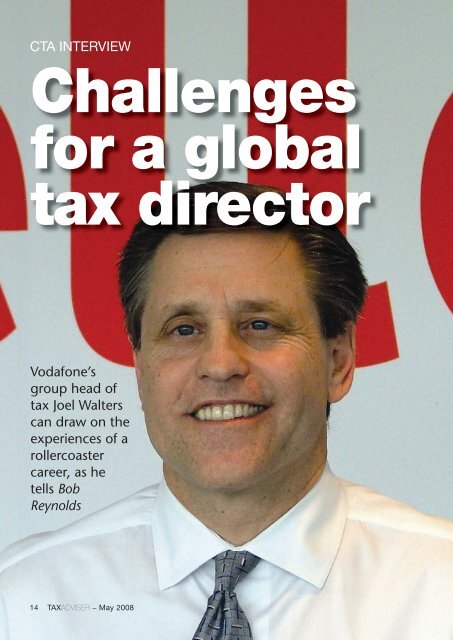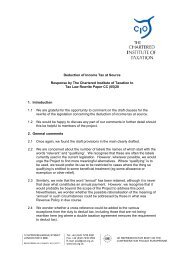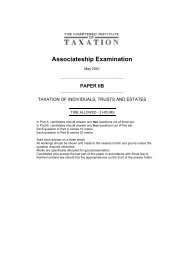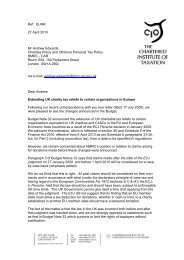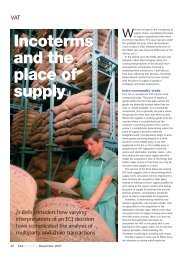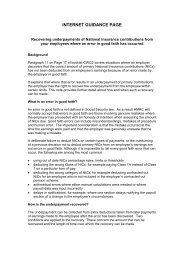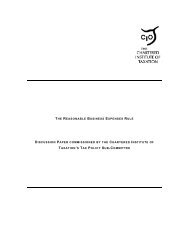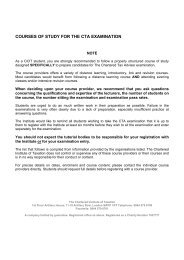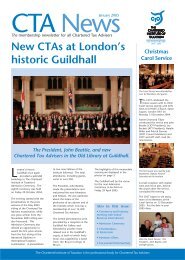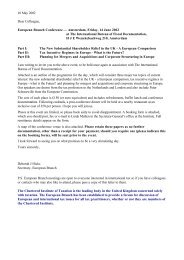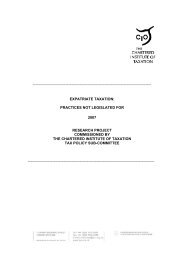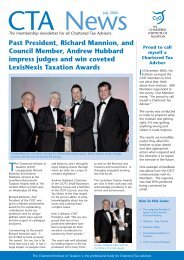CTA INTERVIEW Vodafone's group head of tax Joel Walters can ...
CTA INTERVIEW Vodafone's group head of tax Joel Walters can ...
CTA INTERVIEW Vodafone's group head of tax Joel Walters can ...
Create successful ePaper yourself
Turn your PDF publications into a flip-book with our unique Google optimized e-Paper software.
<strong>CTA</strong> <strong>INTERVIEW</strong>Challengesfor a global<strong>tax</strong> directorVodafone’s<strong>group</strong> <strong>head</strong> <strong>of</strong><strong>tax</strong> <strong>Joel</strong> <strong>Walters</strong><strong>can</strong> draw on theexperiences <strong>of</strong> arollercoastercareer, as hetells BobReynolds14 TAXADVISER – May 2008
<strong>CTA</strong> <strong>INTERVIEW</strong>In April this year, the high court in Mumbaiadjourned a writ issued by VodafoneInternational against a $2bn (£1bn) <strong>tax</strong>demand until late June. India’s <strong>tax</strong> authoritiessought the money after the company’sacquisition <strong>of</strong> Hutchison Essar in May 2007.They claim that capital gains <strong>tax</strong> is due fromVodafone as a result <strong>of</strong> the purchase.The deferment was aimed to allow changes– relevant to the case – to the Income Tax Actto be included in the Finance Bill. Vodafonehas always maintained that no CGT is payablebecause the transaction was conductedbetween <strong>of</strong>fshore structures. The companysaid that Hutchison was responsible for any<strong>tax</strong>es due from the deal.This battle is typical <strong>of</strong> the high-pr<strong>of</strong>ilechallenges faced by multinational companiesin their dealings with national <strong>tax</strong> authoritiesworldwide. Some <strong>of</strong> these have achieved aconsiderable pr<strong>of</strong>ile in the case <strong>of</strong> Vodafone,and form a key part <strong>of</strong> the role <strong>of</strong> <strong>group</strong> <strong>head</strong><strong>of</strong> <strong>tax</strong> <strong>Joel</strong> <strong>Walters</strong>.Asked how he views the attitude <strong>of</strong> <strong>tax</strong>authorities, <strong>Walters</strong> says: ‘I think that variesdramatically. Some countries are at one end <strong>of</strong> thescale and other countries are at the other end. It’sreally hard to talk too generally in that respect. Iguess what I would say is that there is a danger, Ithink, that multinational corporations in particularare perceived as avoiding <strong>tax</strong> in respect <strong>of</strong> how theystructure their operations, and the first thing I’d sayis that <strong>tax</strong> avoidance, defined as not paying theamount <strong>of</strong> <strong>tax</strong> the law requires, is actually very rare.‘Secondly, I think that to the extent thatthere is a view in <strong>tax</strong>ing authorities that <strong>tax</strong> isdriving the business decisions inmultinationals, I think that is also very rare.The reason that those things are very rare isthat corporations have obligations to theirshareholders, they have governance aroundthe decisions they make and how theymanage their business and as a result, I don’tthink that these kinds <strong>of</strong> activities are ascommon as might be viewed. The danger isthat in a multinational context, there may bedisagreement with the government onindividual issues.‘Disagreements between multinationals andthe government with respect to <strong>tax</strong> issues areactually a very small number <strong>of</strong> issues. They<strong>can</strong>, however, be around relatively bignumbers and that creates, I think, an illusionthat there are signifi<strong>can</strong>t amounts <strong>of</strong>disagreements over signifi<strong>can</strong>t numbers <strong>of</strong>issues. Then I’m concerned to some extentthat once this perception begins to permeatethe <strong>tax</strong>ing agency, what tends to happen isthat the focus comes on enforcing the <strong>tax</strong> lossin response to what, I think, is largelyoverestimated <strong>tax</strong> avoidance, and all the effortgoes on enforcement in those areas.’<strong>Walters</strong> has been <strong>group</strong> <strong>head</strong> <strong>of</strong> <strong>tax</strong> for‘If a country viewstheir <strong>tax</strong> system aspurely a tool toextract revenue,that will take itdown a set <strong>of</strong>choices strictlyabout maximisingthe <strong>tax</strong> on theactivities’Vodafone for two years. In that time he hasseen battles with various revenue authorities,some <strong>of</strong> which, like recent ones in India, havespilled over into the courts. The dramaticallycompetitive nature <strong>of</strong> the worldtelecommunications market has also been apressure, along with the difficulties <strong>of</strong>managing and retaining a <strong>tax</strong> team in a worldwhere high-quality people are at a premium.‘I think that the first most overarchingobligation <strong>of</strong> a multinational corporation,’ says<strong>Walters</strong>, ‘is to pay the amount <strong>of</strong> <strong>tax</strong> it is legallyobligated to pay and in the context, as I wassaying before, <strong>of</strong> reducing the overall cost <strong>of</strong>operations, reducing the cost <strong>of</strong> the <strong>tax</strong> it pays onthose business operations within the law. That isthe responsibility <strong>of</strong> a multinational corporationand, by definition, a corporate <strong>tax</strong> department.’<strong>Walters</strong> comments that questions <strong>of</strong> ethicsand morality in the <strong>tax</strong> law are really aboutintegrity. ‘A corporation, and individual <strong>tax</strong>people, must feel that they are comfortablewith the actions they have taken and the waythey have gone about doing their business.’Routes to the topRecent surveys show that many <strong>head</strong>s <strong>of</strong> <strong>tax</strong>take defined routes to the top, usually througha career to partner level in a Big Fouraccountancy practice or a major law firm, andthen a strategic decision to shift into corporate<strong>tax</strong> management. <strong>Walters</strong>’ career could becharacterised as far more diverse. He hasworked for a range <strong>of</strong> companies and hasbeen recruited for two that were outside <strong>tax</strong>altogether. His brief to date has includedburgers, ice cream, a low-cost airline, abottled-water company, a global drinkscompany and now a telecoms company.He is a quiet and cultured Ameri<strong>can</strong> whoseapproach is best characterised by the assertionthat ‘you should expect the unexpected andtake opportunities when they come’.<strong>Walters</strong> took accountancy at university. Heprogressed to law school, with the intention <strong>of</strong>moving into a legal career. In 1983, after threeyears’ training for the legal pr<strong>of</strong>ession, hediscovered there were too many lawyers andnot enough jobs.He joined an accountancy firm in his hometown <strong>of</strong> Minneapolis that led him toWashington DC. ‘It was an extremelyfortunate time to be in Washington. Tax lawwas in the process <strong>of</strong> what ultimately becamea substantial overhaul <strong>of</strong> the rules. I was luckyto be there at that time and focus onunderstanding and mastering the new lawsand ways <strong>of</strong> working. It was a greatopportunity for me.’He joined the UK-based Grand Metropolitanin 1993 as <strong>tax</strong> director <strong>of</strong> Burger King beforebecoming <strong>head</strong> <strong>of</strong> <strong>tax</strong> in North America forGrand Met, when he was responsible for the<strong>tax</strong> affairs <strong>of</strong> brands such as Pillsbury, HäagenDazs and Pearle Vision, as well as Burger King.Grand Met merged with Guinness in 1997to create Diageo, and he relocated to London.He became <strong>head</strong> <strong>of</strong> <strong>tax</strong> for Diageo at the end<strong>of</strong> 2000. He received the call to join Diageo atDisney World. In 1997, he had taken his familyaway for a week’s holiday.‘I had settled into the role <strong>of</strong> senior vicepresident,North America for Grand Met. Theholiday was a bit <strong>of</strong> a celebration that I was inthe right role for me and I could focus on thechallenges it brought without interruption orchange for a while.’The years that followed embraced a range<strong>of</strong> activities, which included running thefinance departments <strong>of</strong> a start-up airline andthe bottled-water company. It was the secondoccasion in a long business career when hemoved out <strong>of</strong> <strong>tax</strong>.TAXADVISER – May 2008 15
<strong>CTA</strong> <strong>INTERVIEW</strong>He says that both experiences gave himrenewed edge and wider perspective. ‘Both <strong>of</strong>these experiences changed the way I thoughtabout business. I realised just how hard it is forentrepreneurs to take a great idea and developit into a successful company. Many <strong>of</strong> thehurdles to success and opportunities for failurefor a business come down to money, whetherthat is finding investment capital or managingcash flow during the early period when theburn rate exceeds revenue growth. Further, somuch <strong>of</strong> the difference between a successfuland growing start-up company and one thatfolds is down to luck – there are so manyindividuals and <strong>group</strong>s out there withincredible ideas which deserve to besupported, and sometimes it <strong>can</strong> simply be alottery as to which ones succeed.’<strong>Walters</strong> runs a <strong>tax</strong> function <strong>of</strong> around 60people globally, with about half the <strong>group</strong> atthe Newbury <strong>head</strong> <strong>of</strong>fice in Berkshire. Thedepartment does most <strong>of</strong> the company’s <strong>tax</strong>work itself. He says that he uses externaladvisers only when they <strong>can</strong> add skills that arenot available in the company.His style is strategic rather than micromanagement.His approach <strong>can</strong> be seen in hisrecruitment <strong>of</strong> a deputy. John Connors arrivedfrom the large business unit at Revenue &Customs last year. Connors says the role wasall about strategy, its development andimplementation. The appointment was ashrewd one because Vodafone had beenlocked in a series <strong>of</strong> battles with the Revenue,and they knew each other well.‘Vodafone advertised in the Financial Timesjust at the time I was really looking andconsidering my options. I’d met <strong>Joel</strong> <strong>Walters</strong>on a couple <strong>of</strong> occasions, as part <strong>of</strong> the 100Group and as part <strong>of</strong> the consultation processon links with big business.‘There are a lot <strong>of</strong> issues in domestic andinternational <strong>tax</strong> where Vodafone has animportant role to play and has an importantvoice at the table,’ says Connors. ‘The role isabout setting a strategic direction, workingwith <strong>Joel</strong>, being a public face <strong>of</strong> Vodafone in aleadership role; I’m expected to roll my sleevesup, get my hands dirty and get involved insome <strong>of</strong> the technical issues and add value.’<strong>Walters</strong> says that running a <strong>tax</strong> function inVodafone is not greatly different from runningone elsewhere. ‘The difference I would say isthat multinational corporations are driven bythe commercial aspects <strong>of</strong> the businesses theyhave to run and, as a result, <strong>tax</strong> activitiesfollow behind the business decisions and thecommercial strategy.‘What’s different about Vodafone ascompared to Diageo or a consumer productcompany is the business that we’re serving.Vodafone is in a complex business with a vastglobal footprint, with signifi<strong>can</strong>t marketvariations in respect to the competitors thatwe deal with and the environment in whichwe operate. The <strong>tax</strong> activities become verydifferent because <strong>of</strong> the business that drivesthe decisions we make day-to-day, and that’sthe piece that has been challenging for me, tolearn a new, more complex business.’Tax and its impact on businessIn the end, the role <strong>of</strong> the <strong>tax</strong> director will belargely driven by the relationships he or shemakes. These are within the company, withgovernments and <strong>tax</strong> authorities and withclients. At Vodafone, there is an acute awareness<strong>of</strong> <strong>tax</strong> and its impact on the business in seniormanagement and among board members.As far as national governments and <strong>tax</strong>authorities are concerned, a company will ask,<strong>Walters</strong> says, whether they want to use the <strong>tax</strong>system as a vehicle to energise investment andbusiness activities or as a tool to extract revenue.‘If a country views their <strong>tax</strong> system as purelya tool to extract revenue, that will take itdown a set <strong>of</strong> choices strictly aboutmaximising the <strong>tax</strong> on the activities. If insteadthe choice is made to attract investment, youmake a separate set <strong>of</strong> choices about how youstructure your <strong>tax</strong> environment, in respect tobase, in respect to rates and in respect to howit encourages investment in thatenvironment.’He also pointed to the approach to freemarkets. ‘Again, two sets <strong>of</strong> choices. One isabout when capital and business activitiesmove across the border, to <strong>tax</strong> those activitiesor have an impact on that free movement, oralternatively, say we live in a world in whichcapital and business activities have flexibility tomove and we’re going to allow that tohappen without creating a boundary at theborder when that happens.’Many <strong>tax</strong> directors say that when the <strong>tax</strong>team is well integrated into a business and therole <strong>of</strong> <strong>tax</strong> is understood, the <strong>tax</strong> discipline <strong>can</strong>perform best. ‘The team in Vodafone <strong>tax</strong> isvery well connected to the business, very wellintegrated,’ <strong>Walters</strong> says. ‘There is no doubtthat no matter how close that relationship isand how integrated the <strong>tax</strong> organisation is,there is still always an element <strong>of</strong> being a greatbusiness partner with that business.‘This includes being able to talk aboutcomplex <strong>tax</strong> issues in terms that <strong>can</strong> betranslated into the impact on the business andhow that fits with the overall business strategy;we <strong>can</strong> always do better at those kinds <strong>of</strong>things, but I think the team is quite good at itand well integrated.’We will continually strive to be an everbetter business partner, which includes thatkind <strong>of</strong> interaction and high level <strong>of</strong>communication about how <strong>tax</strong> fits in theoverall business strategy.’Dreaming <strong>of</strong> running your ownaccountancy practice?Now’s the time.Don’t keep promising yourself it’ll happen.Loosen yourself from the shackles <strong>of</strong> employment and run your own TaxAssist Accountants practice.TaxAssist Accountants currently has over 24,000 clients and over 160 <strong>of</strong>fices and shop fronts. We are an established businessopportunity which <strong>can</strong> <strong>of</strong>fer you all the technical, marketing and field support you need to build a substantial business.We operate in a lucrative market where the service has been and always will be in demand. With our brand name and supportand with your effort, you will be building a real asset for your future.Don’t take it from us. To quote our Torquay based accountant “I <strong>can</strong> honestly say leaving corporate life was the best thingI ever did... and my only wish is that I’d done it sooner!!!”So call us today. Why hang around?0800 0188297Email info@<strong>tax</strong>assist.co.uk or visit www.<strong>tax</strong>assist.net16 TAXADVISER – May 2008


